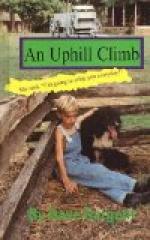Outside, the sheep were blatting stridently their demand for breakfast. The herder bolted coffee and coarse food until he was filled, and went away to his dreary day’s work, telling Ford to make himself at home, and flinging back a hope of further triumphs in pinochle, that night.
Ford washed the dishes, straightened the blankets in the bunk, swept the grimy floor as well as he could with the stub of broom he found, filled the wood-box and then, being face to face with his day and the problem it held, rolled a cigarette, and smoked it in deep meditation.
He wanted to get away from town, and poker games, and whisky, and the tumult it brewed. Something within him hungered for clean, wind-swept reaches and the sane laughter of men, and Ford was accustomed to doing, or at least trying to do, the thing he wanted to do. He was not getting into the wilderness because of any inward struggle toward right living, but because he was sick of town and the sordid life he had lived there.
Somewhere, back toward the rim of mountains which showed a faint violet against the sky to the east, he owned a friend; and that friend owned a stock ranch which, Ford judged, must be of goodly extent; two weeks before, hearing somehow that Ford Campbell was running a poker game in Sunset, the friend had written and asked him to come and take charge of his “outfit,” on the plea that, his foreman having died, he was burdened with many cares and in urgent need of help.
Ford, giving the herder’s frying-pan a last wipe with the dish-cloth, laughed at the thought of taking the responsibility offered him in that letter. It occurred to him, however, that the Double Cross (which was the brand-name of Mason’s ranch) might be a pleasant place to visit. It was long since he had seen Ches—and there had been a time when one bed held the two of them through many a long, weary night; when one frying-pan cooked the scanty food they shared between them. And there had been a season of grinding days and anxious, black nights between, when the one problem, to Ford, consisted of getting Ches Mason out of the wild land where they wandered, and getting him out alive. The problem Ford solved and at the solution men wondered. Afterward they had drifted apart, but the memory of those months would hold them together with a bond which not even time could break—a bond which would pull taut whenever they met.
Ford set down the frying-pan and went to the door and looked out. A chinook had blown up in the night, and although the wind was chill, the snow had disappeared, save where drifts clung to the hollows, shrinking and turning black beneath the sweeping gusts; sodden masses which gave to the prairie a dreary aspect of bleak discomfort. But Ford was well pleased at the sight of the brown, beaten grasses. Impulse was hardening to decision while he stared across the empty land toward the violet rim of hills; a decision to ride over to the Double Cross, and tell Ches Mason




